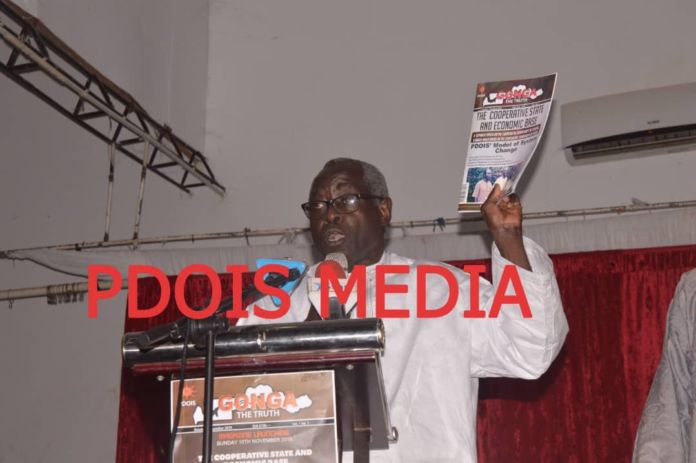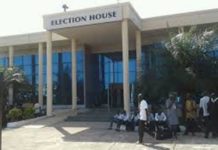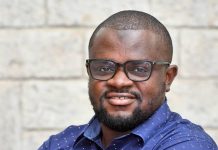By Yankuba Jallow
Honourable Halifa Sallah, the Secretary – General of the People’s Democratic Organisation for Independence and Socialism (PDOIS) said there cannot be meaningful development without knowledge.
“Development must come through knowledge – not through trial error or experimentation,” Sallah said.
Sallah, the National Assembly Member for Serrekunda said this at the launch of their party’s magazine “Gonga” on Sunday, 10th November 2019.
“Gambia is in a crisis – the crisis of mindset. We have a nation but we do not agree on which path to take to build a nation that we all can call our home. We are heading towards December and it was seen absolutely necessary regardless of the odd to hold this launch today,” he said.
He said PDOIS is here to build new Gambians for the New Gambia.
“We must take charge of our destiny but we cannot take charge of our destiny until we know who we are. The “Gonga” aims to help us understand who we are,” he said. “Who are we? That is what we are here to define. What do we own? That is what we are here to identify. What should be our duty? That is what we are here to determine.”
He said people start asking why the villages are still poor. He said with a PDOIS administration, each village will have a treasury for their development.
“The human being needs individual income and social income. The person needs individual consumption and social consumption because we need hospitals and if we don’t have something how will we build them,” he said.
“As you have family farms, you will also have village farms. If you are to water, you will have aqua-culture and if they are in a mining area, they will have share from the mining. If you put lamp or pole or any facility that will earn you income, you will pay them royalty. The village will get their income and will plan its income annually to be able to provide services,” Sallah said.
He said in the late 1970s GPMB used to have a hundred million dalasis. He said what stops the government from doing prospecting because the Government has been mining at Batokunku, Sanyang and Tanji though no one knows how much is earned.
“You need a mining company of the State that will negotiate with those with equipment and make sure that the State has a majority of the shares,” Sallah said.
He said the Gambia is endowed with adequate natural resources.
“The land, the marine and the atmosphere all belong to The Gambia – it belongs to Gambians. You can own a navy but you cannot own a vessel. Does that make sense?”
He said the central government should build the sovereign national wealth to be able to build schools, hospitals, roads among others.
“We are emphasizing that the central government must be an earner of income and not only tax collectors,” Sallah said.
He cited Norway as a good example of what he was explaining. He said this country has a population of about 5.4 million and has a sovereign wealth of about 1 trillion dollars. He said this is because the State built the sovereign national wealth and invested in all sectors of the economy – adding that Norway has the majority of the shares.
“There can’t be a New Gambia without a New Gambian. That’s what brought us here today,” he said.
He said the idea of people demanding what they owned started way before the Gambia attained nationhood in 1965. He said people used to demand for their rights even though their actions were termed as seditious and treason.
Africans used to demand for their rights. He said in 1920 Edward Francis Small came up with “no taxation without representation.” He said governments must exist for the people and, not for the people to exist for the government.
“That is democracy,” he said.
“How many of us here today ask where our taxes go? How many of us will go and vote and say that a programme has been placed before us,” he said.
He said the struggle continued until 1959 when new forces also emerged that there should be greater representation in the rural areas and that brought about the 1960 Universal Suffrage where elections took place throughout the country.
“That showed that Gambia was evolving without the sovereign Gambian evolving. Politics was for its sake rather than for the people. Government that exists for the people, was not the objective – is the people existing for the government?” Sallah asked.
He said the struggle continued in January 1961 when the Workers Union of the Gambia took to the street after the colonislist rejected their demand for better condition – 90% increment and went into the street.
“Today you hear about civil society – how did it emerge? Well, some people came and assisted us to build our civil society to control the democratic space. 1961, I was in Serrekunda School and I saw the unionists marching saying:
“Jallow is our leader we shall not be moved. Jallow is our leader we shall not be moved just like a tree that’s standing by the water side, we shall not be moved. Fighting for our freedom – we shall not be moved.”
I was in primary school then; they came and asked all the teachers to leave and the schools were closed because the civil servants also joined. The country had to undergo crisis -the union leaders were arrested and the order to suppress them drafted but ultimately the force of liberation became too strong and they had to call a constitutional conference. Where are the unions today? What is their role in society? What rights do they have? Where is the joint industrial council that negotiates for better working condition? And we talk about democracy – people existing for government and not government existing for people,” he said.
He said in 1965, a referendum was held but it failed. He added that in 1970, the referendum succeeded and the Gambia became a Republic but yet the people do not know they are sovereign.
Read Foroyaa for more on Sallah’s deliberation, Sidia Jatta’s welcoming remarks and the question and answer session between PDOIS and the invited guests. The guests came from diverse areas including those from civil society, activists, people from other political parties, among others.




















